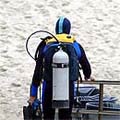« Body fat, body composition report, and diving | Main | First Scuba certification anniversary and diving Tahoe again »
June 29, 2007
Diving as a means for terrorism
In this day and age where we can't even take toenail clippers and a bit of toothpaste or hair gel onto an airplane for fear of its use for acts of terrorism, I suppose almost anything can be seen as a potential threat. So why not scuba diving?
This morning I saw that washingtonpost.com and other news agencies reported that the FBI has recently alerted dive shops around the country to look out for suspicious divers seeking advanced training, including night diving, diving in murky waters and pipes, advanced navigation and use of underwater vehicles. The advisory was said not to be based on a particular threat but as a routine caution. Instructors, the Post quoted, should be aware of "odd inquiries that are inconsistent with recreational diving." With NAUI estimating that there are about 1,800 dive shops around the country there are plenty of places to learn the ins and outs of diving and get the required certifications. Terrorists could then easily rent equipment, have their tanks filled and so on.
But what harm could a scuba diver do? Peruse history and you see that divers often played an important role in warfare. Terrorist fears are thus not unfounded. In WW II, Italian and British divers successfully launched devastating underwater attacks on enemy warships.
The underwater division of the Italian Navy pioneered the use of divers and mini-submarines to attack British ships stationed in Alexandria and Gibraltar in 1941. In December of 1941, the Italian submarine Scire carried three "human torpedoes."  Each of those 23-feet mini subs, also nicknamed "maiale" which is Italian for "pig," (because it was about as difficult to ride and steer like a wild pig) had two divers sitting astride them like cowbows. (The picture shown is of a 1:48 scale model available from a Polish website) The design went back to World War I where the Italians had sunk the feared Austrian battleship Viribus Unitis and a freighter with a modified torpedo that was placed under the warship. The Maiale was powered by a small electric motor and carried up to 650 pounds of explosives in a detachable warhead upfront. The idea was for the two divers to get their ride through anti-submarine measures like nets and such, find their target, dive underneath it, attached the warhead like a mine to the hull of the boat, or perhaps just place it on the bottom, arm it, and then, if possible, hightail out of town. The Italians were remarkably successful with this tactic, attacking and sinking a British tanker and two battleships in the port of Alexandria, Egypt, and sinking several more during the war. (See Wiki entry on the Decima Flottiglia MAS.)
Each of those 23-feet mini subs, also nicknamed "maiale" which is Italian for "pig," (because it was about as difficult to ride and steer like a wild pig) had two divers sitting astride them like cowbows. (The picture shown is of a 1:48 scale model available from a Polish website) The design went back to World War I where the Italians had sunk the feared Austrian battleship Viribus Unitis and a freighter with a modified torpedo that was placed under the warship. The Maiale was powered by a small electric motor and carried up to 650 pounds of explosives in a detachable warhead upfront. The idea was for the two divers to get their ride through anti-submarine measures like nets and such, find their target, dive underneath it, attached the warhead like a mine to the hull of the boat, or perhaps just place it on the bottom, arm it, and then, if possible, hightail out of town. The Italians were remarkably successful with this tactic, attacking and sinking a British tanker and two battleships in the port of Alexandria, Egypt, and sinking several more during the war. (See Wiki entry on the Decima Flottiglia MAS.)
The British captured one of the Italian minisubs and copied the design and diving gear. In 1943, 51-feet long X-craft midget subs (see Wiki entry on the X class subs.), which had both diesel and electric power, tried to sink the German warship Tirpitz moored in a heavily guarded port in northern Norway. The plan was to drop charges underneath both sides of the enemy ship and then detonate them with a time-delayed fuse. That operation was only a partial success, but the Tirpitz was damaged badly enough to be out of commission for a crucial six months.
Diving history is also full of examples of divers using rebreathers to infiltrate enemy territory or perform military operations underwater. They used closed-circuit oxygen rebreathers that issued no tell-tale bubbles at all. The depth limitation of 20 to 30 feet is rarely on obstacle for such operations, and they are still being used today.
So how does all this fit into terrorism 21st century style? Well, the obvious answer is that if nail clippers and toothpaste are viewed as enough of a danger to make them illegal on airplanes, then the use of scuba equipment can represent a significant danger indeed. Terror is psychological warfare and harassment. Massive attacks like 9/11 are few and far between, but the ever-present threat impacts our lives. So it's easy to see how a few strategically executed and highly publicized attacks using scuba technology could have a devastating impact on our sport. Let's hope we won't get singled out. Terror comes in many shapes and forms and it's always better to be safe than sorry. So the FBI advisory makes sense.
Posted by conradb212 at June 29, 2007 11:16 PM








